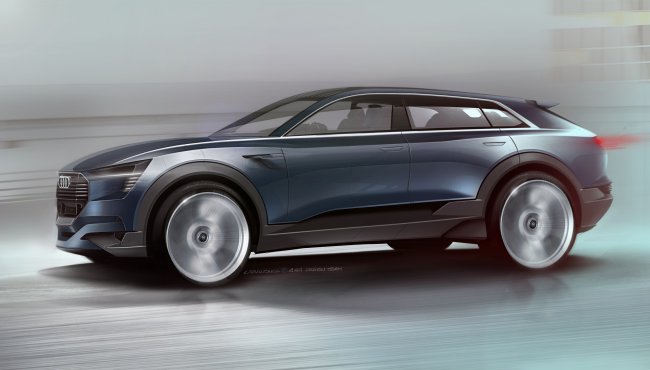Audi, together with Korean battery makers LG Chem and Samsung SDI, aims to take on Tesla with its new full-electric sport utility vehicle that drives 500 kilometers on a single charge.
The German marque is set to unveil a preview of the e-tron quattro concept at the upcoming Frankfurt auto show in September. It plans to put the car into production in 2018 as its first mainstream electric car.
 |
Exterior sketch of the Audi e-tron quattro |
The car’s 500-kilometer driving range is more than triple that of other mass-market EVs on the market.
Except Tesla’s Model S sedan that drives 420 to 560 kilometers depending on trims, top-selling cars like Nissan Leaf and BMW i3 drive some 160 kilometers when fully charged.
The Audi EV’s key rival is expected to be Tesla’s new Model X SUV, which is scheduled to hit the market next month. The car’s driving range is also 500 kilometers.
In a rare partnership, LG Chem and Samsung SDI, two of the world’s top three battery makers along with Japan’s Panasonic, have teamed up to develop big storage batteries for the Audi project.
The two companies declined to elaborate on how they work together and who would take the lead in the whole product development process.
“An EV with a 500-kilometer driving range is a revolution that would help jump-start the still nascent EV market,” an industry source said. “And this is also a competition between the two battery makers. They would try to show off their battery prowess and appeal to other global carmakers for future deals.”
The two companies have poured resources for years into developing smaller but higher capacity batteries for electric cars, because an electric car’s driving range is largely dependent on battery size.
Samsung SDI is the sole supplier for BMW’s first full-electric car i3 as well as the i8 plug-in hybrid sports car, while LG Chem is supplying EV batteries to carmakers like GM, Ford, Daimler and Volvo.
According to the research firm B3, the world’s electric car market is expected to surge from this year’s 2.3 million cars to 6 million by 2020.
During the same period, the market for EV batteries is projected to more than triple from $6 billion to $21.1 billion, the firm said.
By Lee Ji-yoon (
jylee@heraldcorp.com)








![[Weekender] Korea's traditional sauce culture gains global recognition](http://res.heraldm.com/phpwas/restmb_idxmake.php?idx=644&simg=/content/image/2024/11/21/20241121050153_0.jpg)